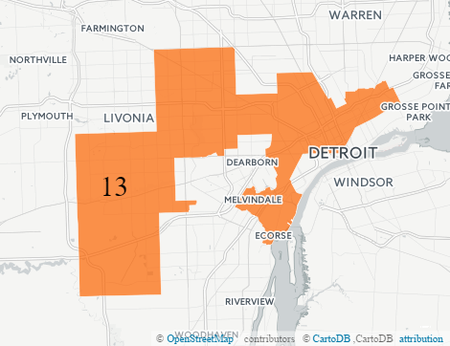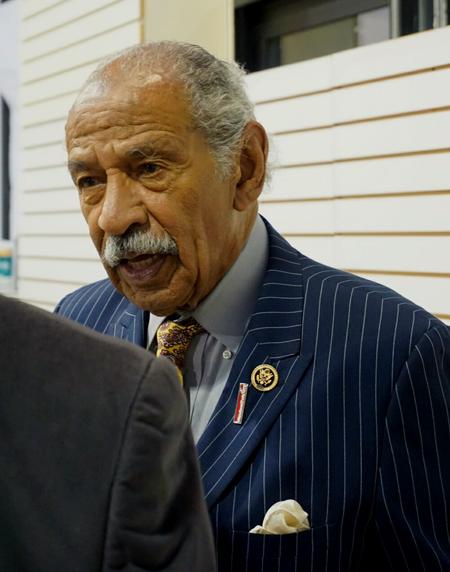Federal Judge Rejects Special Election to Fill Ex-Congressman Conyers’ Seat
A federal judge in Detroit says Michigan’s Governor had the legal right to delay a special election to replace former U.S. Rep. John Conyers. A lawsuit charged that leaving the seat open for almost a year disenfranchised voters in the majority black district.


A federal judge says the congressional seat vacated by Detroit Democrat John Conyers must remain open until elections are held in November.
A group had filed a lawsuit charging the move unfairly deprived Conyers’ former constituents of representation.

Conyers resigned last December amid allegations that he sexually harassed staff members
Gov. Rick Snyder decided to wait to fill the 13th Congressional seat until the already-scheduled primary and general elections, saying it would give prospective candidates more time to prepare.
He also said the move would save taxpayers the cost of funding a special election.
A group of voters sued, arguing that leaving the seat open for almost a year violated the Constitutional right of voters in the majority African-American district to equal protection.
Snyder had previously set an election for an open seat in a majority white district within about two months.
But now a federal judge has ruled that there is no evidence Snyder’s move was racially-motivated, adding that Snyder has both a legitimate reason and the legal right to set a special election at a date of his choosing.
Here’s a statement from the attorney who filed the lawsuit, Michael Gilmore. He is also running as a Democratic candidate to replace Conyers.
“I filed this lawsuit on behalf of the plaintiffs who were concerned that their constitutional rights to vote and be represented in Congress were being denied. They wanted to move the special election date up from November 6, 2018, to an earlier date without delay to allow congressional representation for at minimum half of the year instead of six weeks when important laws impacting the poorest District in Michigan and the third poorest District in the United States are being voted on.”
Judge Goldsmith stated in his Opinion: “The United States Constitution requires a state’s governor to call an election to fill vacancies in that state’s representation in the United States House of Representatives, thereby ensuring that its “[m]embers [are] chosen . . . by the People of the several States.” U.S. Const. art. I, § 2, cl. 1. But the Constitution accords considerable deference to a governor in setting the election date. Having reviewed the extensive record presented, this Court finds no evidence supporting Plaintiffs’ theory that Governor Snyder was racially motivated or otherwise violated equal protection guarantees when he established dates that coincide with the regularly scheduled election dates in August and November of this year. Therefore, those dates will remain in effect.”
Attorney Gilmore stated: “The plaintiffs believe the Governor abused his discretion and unfortunately there wasn’t enough time to go through discovery to collect specific evidence (such as going through the Governor’s emails) to show Snyder intentionally discriminated against the 658,383 residents of the 13th Congressional District. We only had circumstantial evidence and the facts afforded to us to rely on, such as Snyder’s immediate action in 2012 where he held a special election for the 11th Congressional District 60 days after the resignation of Rep. Thaddeus McCotter. In election and voting law, you have to show intent to discriminate against a protected class. The facts of the case did not meet that high burden.” Gilmore went on to say: “Moving the election would require the overt statement of discrimination, making this a very high requirement to meet.” The Court noted that: “Without the proverbial ‘smoking gun’ of an overtly discriminatory statement by a decision maker, it is very difficult to offer sufficient proof of discriminatory purpose.”
“This is textbook voter disenfranchisement. Gov. Snyder continues to treat residents of urban areas across the state as second-class citizens and is violating a laundry list of constitutional laws in doing so. By holding this congressional seat vacant for 11 months, he is denying minority residents of the 13th Congressional District the right to vote and the right to be represented in Congress. This is yet another attempt to further silence the voice of minorities in the state and disregard their views. From putting emergency managers only in minority school districts and city halls to signing-off on the Flint water crisis for fiscal benefit, Governor Synder has historically cited cost-saving measures as his reason for denying civil and human rights to urban areas. Here, he is once again balancing the state’s budget on the backs of Black people, in the name of ‘cost savings’.”
“For 52 years, this seat has been filled by a civil rights leader who helped ensure every American had the right to vote. Immediately following his retirement, the Governor decided that we must standby for nearly a year with no voice at all. A year of laws will be passed, with far-reaching impact on the poorest congressional district in the State of Michigan which is also the third poorest congressional district in the United States. Our residents, minority or otherwise, will have no representation on those decisions and that it ‘Taxation Without Representation’. Republicans, from the White House to Lansing, have done everything they can to suppress the votes of Black and Brown Americans. As the only candidate in the race prior to the vacancy created by Rep. Conyers’ retirement, I fought to demand that the people of this region be represented in Congress by filing a federal lawsuit to require the Governor to allow the people to vote on their representative immediately and if elected as the Representative for the 13th Congressional District of Michigan, I will continue to fight for the citizens of Michigan’s 13th Congressional District.”

